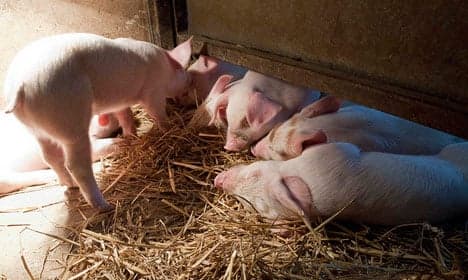Denmark's piglet killing causes anger in Sweden

Swedes have hit out after it emerged that hundreds of thousands of underweight piglets are killed every year in Denmark by banging their heads against the floor.
Hans Aarestrup, head of the Danish organization for swine producers, Danske Svineproducenter, told Swedish Radio’s news programme Ekot on Monday that about half a million piglets are killed every year for "humane" reasons. “Instead of waiting for the weakest pigs to die, we kill them. The most humane way is to grab them by their hind legs and hit them on the floor,” he said. In the latest edition of Danske Svineproducenter’s magazine, they estimate that a farm with one thousand sows could save half a million kroner a year if they put down all newborn pigs weighing less than a kilo, under the headline “Could it be a win-win situation to kill pigs at birth?”. “I think it could be a win-win,” Aarestrup told Ekot. The news has stirred debate in Sweden, with some taking to social media to voice their criticism. The editor of a Swedish food magazine tweeted: "If you need another reason to boycott Danish pig, it's being served up here..." Margareta Åberg, pig expert for the Federation of Swedish Farmers, told The Local's team in Stockholm that the procedure could not happen in Sweden. “We only put down pigs if they are so ill that they cannot be cured. The goal is always that as many of them as possible should survive,” she said. It is not the first time Danish meat production has come under fire in Sweden. In November, a random sampling of pork in supermarkets found high amounts of the resistant MRSA bacteria in meat imported from Denmark and Germany. Denmark’s pork industry has also been criticized in Norway, where that country’s largest retailer said it might drop all imports of Danish pork due to MRSA concerns.
Comments
See Also
Hans Aarestrup, head of the Danish organization for swine producers, Danske Svineproducenter, told Swedish Radio’s news programme Ekot on Monday that about half a million piglets are killed every year for "humane" reasons.
“Instead of waiting for the weakest pigs to die, we kill them. The most humane way is to grab them by their hind legs and hit them on the floor,” he said.
In the latest edition of Danske Svineproducenter’s magazine, they estimate that a farm with one thousand sows could save half a million kroner a year if they put down all newborn pigs weighing less than a kilo, under the headline “Could it be a win-win situation to kill pigs at birth?”.
“I think it could be a win-win,” Aarestrup told Ekot.
The news has stirred debate in Sweden, with some taking to social media to voice their criticism. The editor of a Swedish food magazine tweeted: "If you need another reason to boycott Danish pig, it's being served up here..."
Margareta Åberg, pig expert for the Federation of Swedish Farmers, told The Local's team in Stockholm that the procedure could not happen in Sweden.
“We only put down pigs if they are so ill that they cannot be cured. The goal is always that as many of them as possible should survive,” she said.
It is not the first time Danish meat production has come under fire in Sweden. In November, a random sampling of pork in supermarkets found high amounts of the resistant MRSA bacteria in meat imported from Denmark and Germany.
Denmark’s pork industry has also been criticized in Norway, where that country’s largest retailer said it might drop all imports of Danish pork due to MRSA concerns.
Join the conversation in our comments section below. Share your own views and experience and if you have a question or suggestion for our journalists then email us at [email protected].
Please keep comments civil, constructive and on topic – and make sure to read our terms of use before getting involved.
Please log in here to leave a comment.